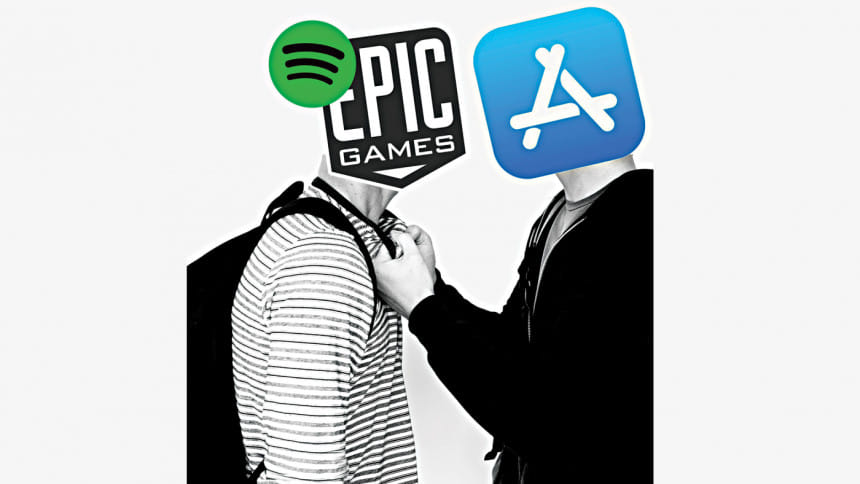Developers mad at giving up 30% of the Apple pie

Over the last year, companies have been getting more vocal about their disagreement with the sales cuts Apple takes from its app store. App developers like Epic Games and the digital music service Spotify have recently challenged Apple, the most valuable company in the world, for the company's policy of taking a large cut of its app store sales.
The App Store is one of the most prominent centres for commerce. Last year, the platform led to half a trillion dollars in sales. And Apple still takes 30% of the sales on its platform from third-party developers. This cut has made way for tremendous growth for Apple in recent years. However, it has also caused some problems in the guise of antitrust scrutiny, dissatisfaction from app developers, and several lawsuits from consumers and business partners. These problems were further intensified when Epic Games recently sued both Apple and Google, accusing them of breaking antitrust laws and forcing app developers to pay 30% of the revenues generated.
Epic Games are the maker of Fortnite, arguably the most popular game in the world right now. The game has recently been removed from both the Apple and Google Store in response to the developers' encouraging direct payment through the app instead of the payment services of Apple and Google. This removed the payment processing fees that the app store owners could avail. After Apple had pulled Fortnite out of the App Store, Epic launched an in-game event inside Fortnite creating awareness among gamers and released an epic parody video titled "Nineteen Eighty-Fortnite" with the hashtag "#FreeFortnite" mocking Apple's "1984" commercial for the Mac.
Do the Companies Really Need a Third of App Store Sales?
Apple and Google together are worth more than $3 trillion and they provide software to support a majority of the world's smartphones. This dominance has ensured higher bargaining power enabling high commissions consistently for the giants. A 30% cut seems illogical to the developers for payment processing and better security as credit card companies charge around 3% for similar services. This is a rising sentiment among the developers and regulators. Moreover, the tech giants do not have to resort to app store charges as their manufactured smartphones have become the only way for businesses to reach people. Unlike Apple, Google has much lower stakes in its Play Store as the store is a much smaller portion of its overall business. They have not impacted Epic Games the way Apple has. Android users can download apps from outside of the android app store. This leaves Epic with numerous ways to reach consumers with android devices.
How are Consumers Impacted?
One side-effect of this 30% sales cut is the increasing cost for consumers. The developers have to pass the added cost to consumers in order to survive and support the app store policy. Spotify, for instance, increased its monthly subscription back in 2014 from $10 to $13 to accommodate Apple's fee. Apple then took advantage of the situation by introducing its own music streaming service at $10. Now, Spotify subscription in a website is a must however, they can not mention that in the Spotify iPhone app. Besides developers, consumers also spoke up against Apple in 2019 and filed a huge class-action lawsuit that accused Apple of breaking antitrust laws while enforcing the commission and inflated app prices for iPhone users.
On August 7, Facebook joined the talks and complained against Apple's collecting of 30% of sales in live events where people and small businesses share seminars, talk about fitness and take cooking classes through the Facebook app. Facebook wanted to process the payments by themselves so that all of the generated revenues could go directly to the small businesses that generated the contents. However, Apple declined to do so. When asked about the problems and disagreements, Apple's CEO Tim Cook defended the company in front of Congress mentioning a better situation prevailing for developers than the past, when 50-70% of the retail price used to go to the middlemen.
The Way Forward
Apple generates more sales through its App Store although Android is much more widely used as an operating system. Epic, for example, generated around $43 million through Apple's App Store whereas it earned only a little more than $3 million in sales from Google Play. (CNBC, Sensor Tower) So, Apple remains the most crucial option for developers as far as making money is concerned. However, the rules and policies have to change to establish a much better ecosystem for the developers and final consumers. With recent disagreements piling up and spilling out into the public forums, Apple might have to concede to ease the tensions and shift the momentum in their favor.





Comments